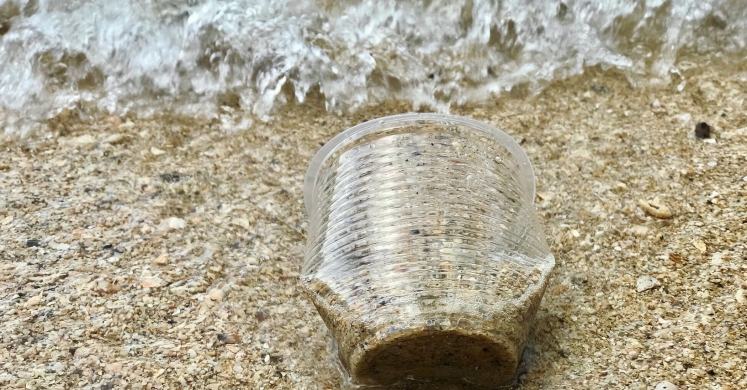Phipps Stories

#bioPGH: In Honor of Shark Week, Reconsider Plastic!
 A resource of Biophilia: Pittsburgh, #bioPGH is a weekly blog and social media series that aims to encourage both children and adults to reconnect with nature and enjoy what each of our distinctive seasons has to offer.
A resource of Biophilia: Pittsburgh, #bioPGH is a weekly blog and social media series that aims to encourage both children and adults to reconnect with nature and enjoy what each of our distinctive seasons has to offer.
It’s that time of year again—Shark Week is full steam ahead, and many of us with cable are glued to the Discovery Channel. Like last year, we might wonder if our everyday lives here in Western Pennsylvania have an impact on sharks, and surprisingly…they do. Quite a bit, actually. Thus, in honor of Shark Week, let’s look at one major way even all of us landlocked folks can have a direct impact on what happens in the oceans: our plastics.
Plastics, once the wonder product of chemistry, have become ubiquitous in our daily lives, and they are detrimental to natural systems. An estimated eight million metric tons of plastics make it into our planet’s oceans annually in the form of everything from commercial fishing equipment to toothbrushes to plastic water bottles. These plastics damage marine habitat, enter the food web, and can hurt wildlife.
The best solution is for all of us to collectively to use less plastic—especially single-use plastics. We can try to recycle when possible, but the US is struggling to recycle our plastics right now. We need to take action individually. Below are some easy changes we can all use as a starting point:
Start Keeping Track of the Plastics
Once we start looking for the plastics in our lives, we realize it’s everywhere! Plastic wraps, excessive packaging, plastic zip bags and plastic bottles for milk, salad dressing, juices, water, cleaning products and more! Don’t be intimidated, though. Awareness is just the first step we need to take. Then we can start talking with our shopping and look for products with different packaging strategies.
Use those Reusable Bags
I will fully admit to forgetting my grocery bags on occasion, but we should all keep practicing this action because of the sheer volume of new plastic in the world just from our bags! In the US alone, it costs us 12 million barrels of oil to produce them annually, and the average household goes through 1,500 bags per year.
Opt for Reusable Bottles instead of Bottled Water and Bottles of Soda
This is probably the easiest yet most effective transition you can make. Americans used 50 billion bottles of water in 2017, and only 23% of those bottles were sent to be recycled (and of that 23%, it is unclear how much was actually recycled). Besides saving you the concern of endocrine disruptors in plastic packaging, using your own water bottles is a huge way to cut back on plastic use.
BYOP – Bring your own plastic-substitutes!
Going out to dinner? Bring your own to-go containers and straws rather than rely on the restaurants. Staying at a hotel with plastic serving ware for breakfast? Bring a cutlery travel pack with you.
Start the Trend
Do you use social media? Share about the concerns with plastics. Write to your elected officials about the problems with plastics, or email companies about their products’ packaging. And remember, your actions are your loudest words. Model the changes you want to see around you, and others will follow.
If you have been successfully cutting back on plastic use, we would love to hear about! Share your tips and suggestions in the comments below. Cutting back on plastics use will be a team effort, so let’s get this teamwork started!
Connecting to the Outdoors Tip: If you would to help with existing ocean clean-up efforts, Keep Pennsylvania Beautiful organizes an annual clean-up of our local waterways to prevent trash from entering the oceans.
In the end, we aren’t likely to see many sharks out and about in our area, but I was interested to hear other folks’ thoughts on the importance of the oceans, so I asked the experts: our summer day campers. In between art projects and science experiments, here is what a few of our Conservation Crew campers had to say about why ocean life is important even to us in Pennsylvania:
“We want the oceans because we want the fish—they provide us food and they keep the food cycle intact and keep the oceans healthy.”
“I hope that the ocean stays clean for quite some time because if the fish in the ocean have problems and die off, it will hurt all of us too.”
“If we litter in the Three Rivers, that can make it back to the ocean and the fish won’t like that.”
“We need to keep the coral safe!”
Well, there you have it! So let’s keep those oceans clean!
Photo credits: Public domain

